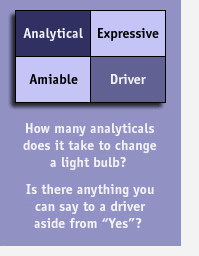
Four Personality Styles
| Продажи | ||||
| Sales.com | ||||
| Assessing... | ||||
by Graham Denton
We sell tangible results to companies but we do it through people, and the people generally have needs that are not at all tangible. This makes selling a psychological process, and the process is made more complicated by the palpable fact that no two people's intangible needs are exactly alike. In Miller Heiman terminology, it's not enough to deliver Wins to all of your Buying Influences; you have to do it in a highly individualized manner. There's no point in delivering the Win of greater authority to a company VP if his or her most pressing need is for more free time.
 One
popular framework for categorizing individual customers -- and therefore
for better understanding their personal needs -- breaks people down into
four operational styles, or personalities. According to this model, every
buyer you meet is going to be either an "analytical," an "expressive,"
an "amiable," or a "driver."
One
popular framework for categorizing individual customers -- and therefore
for better understanding their personal needs -- breaks people down into
four operational styles, or personalities. According to this model, every
buyer you meet is going to be either an "analytical," an "expressive,"
an "amiable," or a "driver."
Analyticals. As the word indicates, analytical personalities like to pick things apart and see how they work -- or don't work. They're generally unemotional and intensely rule-driven, they have a seemingly superhuman tolerance for detail, and they like to see everything backed up by facts and figures. In dealing with analyticals, be ready to quantify everything and to provide the research-backed documentation that these eminently logical people often require. They're fearful of fuzziness or unanswered questions, and they have a deep need to have everything as finely tuned as they are. Sell to analyticals by feeding them the facts, and backing them up with more facts.
Expressives. Garrulous, convivial, expansive. These are the key words for describing an expressive personality. Expressives are the classic extraverts, gaining their sense of self-worth from their ability to command applause. They are devoted to winning, yet they're not competitive in the traditional sense; their intention is to have everyone enjoy their victory, rather than lording it over those they have beaten. So they're perfectly willing to let the salesperson share the fruits of success, as long as it's clear that the fundamental credit will go to them. Sell to expressives by bringing them irresistible solutions, then allowing them to believe that they have brought them to you.
Amiables. Even more than expressives, amiables have a need to spread the good news around. To amiables, negotiating seems like a chore that they wish would go away; they have a strong internal need to achieve conflict-free consensus. Using high-pressure tactics with these people, therefore, is an invitation to failure; amiables pride themselves on flexibility, but they won't be bowled over. Sell to amiables by emphasizing the range of individuals who will Win with your solution, that is, the broad base of harmony you'll be able to achieve.
Drivers. Both amiables and expressives would prefer more rather than fewer people to feel satisfied as the result of a sale or negotiation. For drivers, that's seldom a consideration. Drivers are the supreme competitors, the all-out alphas. Their strongest inner need is to be in charge, and to maintain that psychological position they are willing to use any number of controlling tactics, including insult and intimidation. Drivers need to be bosses, even when (or especially when) their job titles don't justify that supposition; indeed, this operational style is most common among lower-level managers. Be prepared, when you're selling to a driver, to experience some animosity. It's your call whether or not the prospective business is worth the abuse.
This quartet of personality types is, of course, only a model. In reality most people display varied mixtures of amiability and analysis, conviviality and competitiveness. The savvy salesperson assesses each individual's peculiar composition of these qualities, and adapts accordingly to each customer's personal needs.